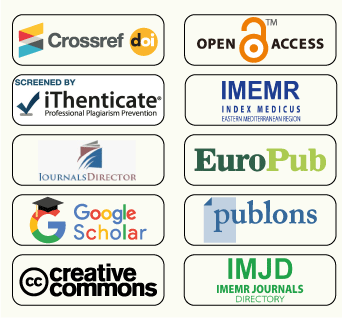Transformational leadership practices and excellence in the public family planning sector in Egypt
Abstract
There are current challenges facing Family Planning sector in Egypt. They are significantly associted with population problem in Egypt that might act as a barrier against achieving Egypt Vision 2030. Effective leadership is a window of hope toward resolving such challanges. The study aimed at assessing followers’ perception of transformation leadership at public family planning sector and identify the relation between transformation leadership behavior and achieving excellence.A cross section study included 148 Family planning providers to assess their perception towards commitment of leaders with transformational leadership practices using a structured Transformation leadership questionnaire consist of 20 statments coving the four domains namely idealized influence, inspirational motivation, individual considerations and intellectual stimulation. The mean score for all domains of transformational leadership vary slightly from 2.1 to 2.2 with a minimum of 0 and a maximum of 4. Similarly, the total TSL score ranged from 0.7 to 3 with a mean of 2.2±0.5. The average total score of transformational leadership for providers working at excellence awarded clinics was 2.4 compared to 2.0 for non-excellent clinics and this difference was statistically significant. similar difference was found in all individual domains. The study concluded that a positive but not optimal level of transformational leadership practices in this healthcare setting was perceived by providers. This highlights areas for potential improvement. Developing transformational leadership capabilities could be a key strategy for public family planning settings aiming to improve their operational performance and hence achieving the ultimate goal for such important sector.
Received: 08 August 2024
Accepted: 02 September 2024
Published: 14 October 2024
Keywords
Full Text:
PDFReferences
Steinmann B, Klug HJP, Maier GW. The path is the goal: How transformational leaders enhance followers’ job attitudes and proactive behavior. Front Psychol. 2018;9(NOV).
Bass BM, Riggio RE. Transformational leadership (2nd ed.). Transformational leadership (2nd ed). 2006;
Avolio BJ, Zhu W, Koh W, Bhatia P. Transformational leadership and organizational commitment: Mediating role of psychological empowerment and moderating role of structural distance. Vol. 25, Journal of Organizational Behavior. 2004.
Judge TA, Piccolo RF. Transformational and Transactional Leadership: A Meta-Analytic Test of Their Relative Validity. Journal of Applied Psychology. 2004 Oct;89(5):755–68.
Bass BM, Avolio BJ. MLQ Multifactor Leadership Questionnaire for research. Mind Garden. 1995.
Alkhaja BA& Minian CM. The Practice of Transformational Leadership Style in the Ministry of Labour and Social Development in the Kingdom of Bahrain. European Journal of Business and Management. 2019 Sep;
Seval; TOKER D. Construction of a likert-type transformational Leadership Scale. Ankara Üniversitesi Dil ve Tarih-Coğrafya Fakültesi Dergisi - DTCF Dergisi. 2017;57(2).
Asencio H. Leadership, trust and organizational performance in the public sector. Transylvanian Review of Administrative Sciences. 2016;2016(Special Issue).
Hardy L, Arthur CA, Jones G, Shariff A, Munnoch K, Isaacs I, et al. The relationship between transformational leadership behaviors, psychological, and training outcomes in elite military recruits. Leadership Quarterly. 2010;21(1).
Antonakis john. Transformational and Charismatic Leadership. 2nd edition. Sage Publications; 2012. 299–319 p.
Thanh NH, Quang N Van. Transformational, Transactional, Laissez-faire Leadership Styles and Employee Engagement: Evidence From Vietnam’s Public Sector. Sage Open. 2022;12(2).
Wong CA, Cummings GG, Ducharme L. The relationship between nursing leadership and patient outcomes: A systematic review update. J Nurs Manag. 2013;21(5).
Mäntynen R, Vehviläinen-Julkunen K, Partanen P, Turunen H, Miettinen M, Kvist T. Changes in Transformational Leadership and Empirical Quality Outcomes in a Finnish Hospital over a Two-Year Period: A Longitudinal Study. Nurs Res Pract. 2014;2014.
Boamah SA, Spence Laschinger HK, Wong C, Clarke S. Effect of transformational leadership on job satisfaction and patient safety outcomes. Nurs Outlook. 2018;66(2).
Thompson CA, Buchbinder SB, Shanks NH. Introduction to health care management. 2nd edition. Burlington, Mass. : Jones & Bartlett Learning; 2012. 91–108 p.
Family planning [Internet]. 2016. Available from: https://egypt.unfpa.org/en/node/22543
Ismael H, Sleem W, Abd el-Ghani A. Relationship Between Transformational Leadership Style and Job Satisfaction among Nurse. Mansoura Nursing Journal. 2024 Jan 1;11(1):357–68.
Owuor Peter. Effects of transformational leadership style on organizational performance in kenya: a case study of kenya breweries limited [Internet]. The Management University of Africa ; 2918. Available from: https://core.ac.uk/download/pdf/224836799.pdf
Ibrāhīm al-Ḥabīb Kh, Suḥaymān al-Shammarī A, Shāmān al-Ḥarbī S. al-Qiyādah al-taḥawwulīyah madkhal li-taḥsīn al-adāʼ al-waẓīfī li-muʿallimāt al-marḥalah al-ibtidāʾīyah bi-minṭaqat Ḥāʾil – dirāsah mustaqbaliyyah. Majallat Kullīyat al-Tarbiyah Jāmiʿat Ṭanṭā [Internet]. 2022 Oct 1;85(4):259–308. Available from: https://mkmgt.journals.ekb.eg/
Yusoff MSB. ABC of Content Validation and Content Validity Index Calculation. Education in Medicine Journal. 2019;11(2).
Sfantou DF, Laliotis A, Patelarou AE, Sifaki-Pistolla D, Matalliotakis M, Patelarou E. Importance of leadership style towards quality of care measures in healthcare settings: A systematic review. Vol. 5, Healthcare (Switzerland). 2017.
Wong CA, Cummings GG, Ducharme L. The relationship between nursing leadership and patient outcomes: a systematic review update. J Nurs Manag. 2013 Jul;21(5):709–24.
Bass Bernard, Avolio Bruce. Improving organizational effectiveness through transformational leadership. 1994.
Thorne EA, Wright G. Developing strategic alliances in management learning. Journal of European Industrial Training. 2005;29(5).
Hoch JE, Bommer WH, Dulebohn JH, Wu D. Do Ethical, Authentic, and Servant Leadership Explain Variance Above and Beyond Transformational Leadership? A Meta-Analysis. J Manage. 2018;44(2).
Bottomley K, Burgess S, Fox M. Are the behaviors of transformational leaders impacting organizations? A study of transformational leadership. International Management Review. 2014;10(1).
Dinh JE, Lord RG, Gardner WL, Meuser JD, Liden RC, Hu J. Leadership theory and research in the new millennium: Current theoretical trends and changing perspectives. Vol. 25, Leadership Quarterly. 2014.
DOI: https://dx.doi.org/10.21622/AMPDR.2024.04.2.955
Refbacks
- There are currently no refbacks.
Copyright (c) 2024 Hanady Samy Ahmed, Heba Mahmoud Elweshahi, Ayman Ahmed Ragab
Advances in Medical, Pharmaceutical and Dental Research
E-ISSN: 2812-4898
P-ISSN: 2812-488X
Published by:
Academy Publishing Center (APC)
Arab Academy for Science, Technology and Maritime Transport (AASTMT)
Alexandria, Egypt
ampdr@aast.edu



